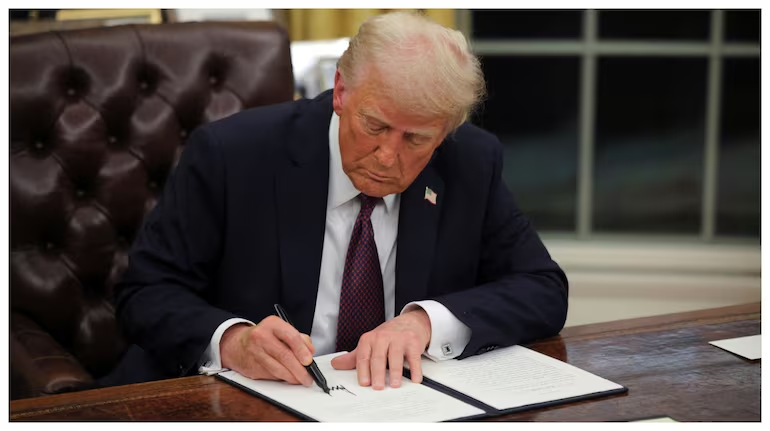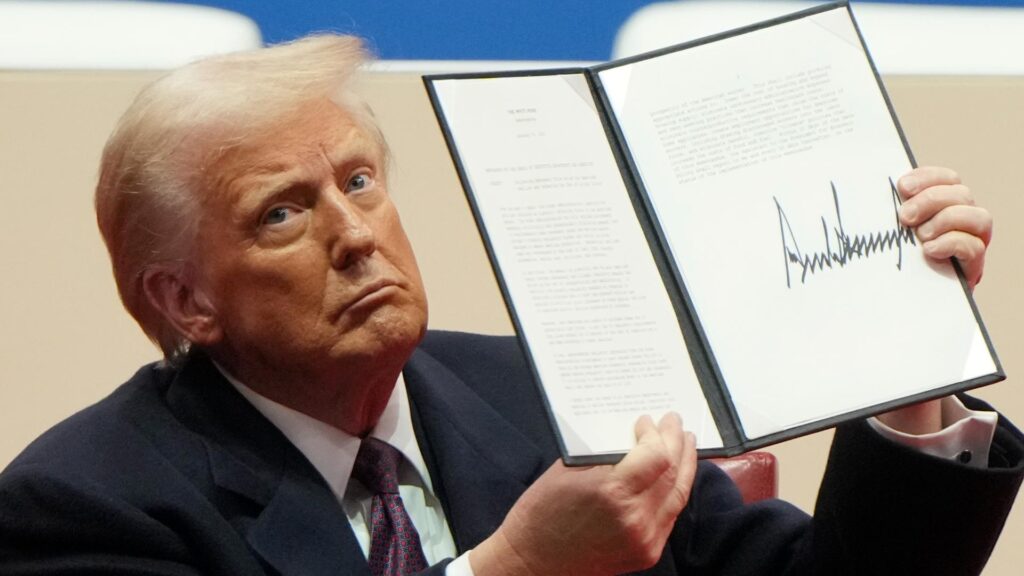Previous President Donald Trump’s chief request to reclassify U.S. inheritance citizenship has ignited extraordinary discussion over its suggestions for movement and protected regulation. The request difficulties the well-established understanding of the Fourteenth Amendment, which awards programmed citizenship to people brought into the world on U.S. soil, no matter what their folks’ movement status. Advocates contend that the move tends to worry over the “birth of the travel industry” and unapproved migration, attesting that citizenship ought to be attached to devotion and legal presence.
Pundits, nonetheless, argue that the leader’s request sabotages established standards and could confront henormouslawful difficulties, as the Fourteenth Amendment’s language has been broadly deciphered to attest to general inheritance citizenship. This disputable choice features continuous divisions over movement strategy and brings up issues about the extent of leader expertise in reclassifying sacred privileges. As the discussion unfurls, the expected social, legitimate, and political implications of this leader request to stay at a point of convergence in public talk.
The 14th Amendment and Birthright Citizenship
The Fourteenth Amendment to the U.S. Constitution, which was confirmed in 1868, is the underpinning of the inheritance citizenship guideline. The key arrangement, the Citizenship Proviso, specifies that “all people conceived or naturalized in the US, and dependent upon the locale thereof, are residents of the US and of the state wherein they live.” This condition has been deciphered for more than 100 years to ensure U.S. citizenship to, for all intents and purposes, anybody brought into the world on American soil, no matter what their folks’ migration status.
Trump’s chief request was meant to adjust the understanding of this condition, looking to limit the extent to which one meets all requirements for programmed citizenship by birth in the U.S. His mandate proposed rethinking the “dependent upon the ward” part of the statement, with the goal of barring kids brought into the world to non-residents or undocumented workers.
The Purpose Behind the Executive Order
The essential objective of Trump’s chief request was to control the supposed “birth of the travel industry” and diminish the number of youngsters brought into the world in the U.S. who naturally gain citizenship by ideals of their origination. Birth, the travel industry, alludes to the training where pregnant ladies, frequently from unfamiliar nations, travel to the U.S. to conceive offspring. Along these lines, they guarantee their youngster’s U.S. citizenship.

Trump contended that this training was being taken advantage of by people trying to avoid movement regulations. By restricting inheritance citizenship, he would have liked to forestall what he viewed as maltreatment of the framework and lessen the number of undocumented migrants entering the country.
The Legal and Constitutional Challenge
One of the most argumentative parts of Trump’s leadership request was the lawful test it presented to the Fourteenth Amendment. The president’s claim that he could singularly change the sacred translation regarding inheritance citizenship was met with far-reaching analysis from legitimate specialists, protected researchers, and legislators. Many agreed that the Constitution’s Citizenship Statement couldn’t be changed through a leader’s request alone.
Lawful researchers noticed that any significant change to inheritance citizenship would require either an established correction, a milestone High Court administering, or new government regulation, which are all fundamentally more mind-boggling and testing than a leader request. The request, hence, was considered by a lot of people to be an endeavor to sidestep laid-out established insurances.
The “Anchor Baby” Debate
Trump’s proposition revived the dubious discussion of “anchor babies,” a term frequently utilized by opponents of inheritance citizenship to describe kids brought into the world as undocumented foreigners. Advocates of inheritance citizenship, on the other hand, contend that it mirrors the comprehensive idea of an American majority-rules government, guaranteeing that youngsters brought into the world in the U.S. have equivalent privileges under the law, no matter their parents’ status.
The expression “anchor child” has been reprimanded for its unfortunate underlying meanings and its utilization in the political manner of speaking. Pundits contend that it unreasonably demonizes youngsters and their families while additionally distorting the fundamental factors of settler networks. By and by, the issue turned into a point of convergence of Trump’s more extensive migration plan, which tried to restrict both lawful and unlawful movement.
Implications for Children of Non-Citizens
If Trump’s leader’s request was effectively executed, it could have significant ramifications for kids brought into the world in the U.S. to non-residents, especially undocumented outsiders. These youngsters, who might, in some way or another, have been allowed programmed citizenship, could confront critical lawful and social difficulties. Without the security of inheritance citizenship, such kids would likely be in danger of statelessness or won’t approach significant privileges and administrations, including medical services, training, and legitimate assurances.
Moreover, children brought into the world as non-residents could wind up trapped in the crossfire of court fights and political discussions that could postpone or convolute their capacity to obtain U.S. citizenship. The long-term effect of such a shift could change the demographic makeup of the nation and decrease the number of people who are ensured freedoms by the U.S. government.
The Impact on Immigration Policy
Trump’s chief request was essential for more extensive work to reshape the strategy of the U.S. movement. By zeroing in on inheritance citizenship, Trump tried to address his more extensive worries about unlawful migration and saw maltreatment of the country’s movement framework. Nonetheless, his methodology brought up issues about the viability and decency of such a strategy shift.
Rivals of the chief request contended that it was an interruption from the additional major problems encompassing exhaustive movement change, like the destiny of Visionaries (youthful undocumented migrants brought to the U.S. as kids) and the requirement for a way to citizenship for a large number of undocumented specialists.
The request likewise highlighted the more extensive philosophical gap in U.S. legislative issues regarding migration. Trump conforms to hardline perspectives that focus on security and severe movement controls. In contrast, others advocate for a more comprehensive, helpful methodology.
The Public Reaction and Political Backlash
Trump’s chief request encountered significant resistance both locally and globally. Social equality associations, migration advocates, and numerous majority-rule legislators denounced the move as an assault on the Fourteenth Amendment and an infringement of essential protected freedoms. They contended that the move was biased, especially against youngsters brought into the world to outsider guardians, and that it subverted the comprehensive qualities America is known for.

However, numerous conservatives and traditionalists upheld the request, considering it a fundamental step toward preventing unlawful migration and safeguarding American sovereignty. Notwithstanding, the lawful vulnerability surrounding the request prompted a range of feelings on its suitability and possible effect.
The Role of Congress in Immigration Reform
While Trump’s chief request was to change the understanding of inheritance citizenship, legal researchers and policymakers contended that such a vast shift would require regulation passed by Congress and leadership activity. They suggested that the regulatory cycle would consider a more careful discussion of the benefits of rethinking citizenship and guarantee that any progressions were intrinsically strong.
A few conservatives in Congress expressed interest in regulating inheritance citizenship; however, such a move would obviously encounter critical resistance in the Senate and from social liberties advocates.
Potential Impact on Immigrant Communities
Whenever carried out, the redefinition of inheritance citizenship would have had critical ramifications for settler networks. Kids brought into the world to undocumented guardians, remembering numerous for the Latino and Asian settler networks, would at this point not naturally be conceded U.S. citizenship, possibly leaving them helpless against extradition or lawful limbo.
The strategy change could likewise have consequences for families who tried to establish long-lasting residency or citizenship through their children, further confounding pathways to legitimate status for migrants. This might have created an underclass of individuals who were prohibited from the full advantages of citizenship despite being brought into the world in the U.S.
Frequently Asked Questions
What is inheritance citizenship?
Inheritance citizenship alludes to the law that is appropriate for people brought into the world on U.S. soil to get U.S. citizenship. Citizenship, as ensured by the Fourteenth Amendment.
What did Best’s leader arrange propose?
The chief request was to rethink inheritance citizenship, restricting programmed citizenship to children brought into the world who are U.S. residents or legitimate long-term inhabitants.
What is the Fourteenth Amendment’s position on citizenship?
The Fourteenth Amendment expresses that all people conceived or naturalized in the U.S. Furthermore, likely to its locale are residents, a proviso customarily deciphered to incorporate essentially all people brought into the world on U.S. soil.
For what reason did Best seek after this change?
Trump contended that the change was essential to address worries over the “birthing of the travel industry” and unapproved movement, guaranteeing that the ongoing understanding boosted abuse of the framework.
What are the legitimate difficulties from the request’s perspective?
Pundits contend the leader’s request goes against the Constitution and surpasses official power, as changes to established freedoms typically require a sacred revision.
How does this affect undocumented migrants?
Whenever implemented, the request could deny citizenship to youngsters brought into the world in the U.S. to undocumented outsiders, modifying their legitimate status and freedoms.
What are the more extensive ramifications of the request?
The request raises essential issues about sacred translation, chief power, and the privileges of people born in the U.S.
Has the request been carried out?
At this point, such a request would face broad lawful difficulties, and the courts are expected to nullify it, deferring or forestalling its execution.
Conclusion
Trump’s leader’s request to rethink U.S. inheritance citizenship addresses a striking and combative move with sweeping ramifications for migration strategy, established regulation, and the extent of chief power. By testing the well-established understanding of the Fourteenth Amendment, the request has touched off a public discussion over the harmony between tending to migration concerns and safeguarding sacred insurances. Defenders view the move as a vital stage to control the maltreatment of the framework. At the same time, pundits caution about its capability to subvert crucial freedoms and make legitimate social vulnerabilities. The request’s destiny will depend on the legal survey, as it tests the constraints of the official ability to reevaluate sacred standards singularly.

